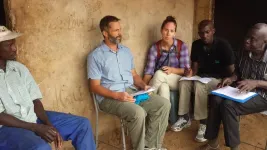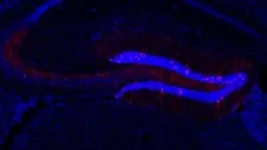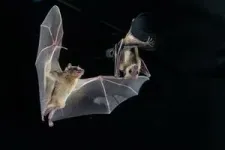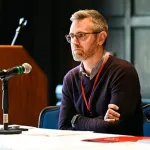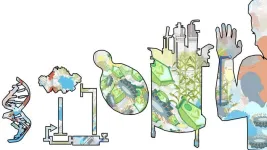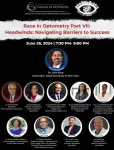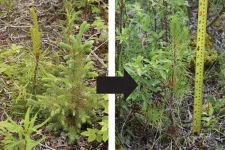(Press-News.org) (Santa Barbara, Calif.) — What if you could take an ecologically degraded environment that presents a public health problem, and devise a powerful and elegant solution that not only restores its functionality but also reduces its health impacts while addressing food and water access and alleviating poverty? An international team of biologists, social scientists and medical researchers in the U.S. and Senegal did just that, and for their innovation and research, published in the journal Nature, has received several prestigious awards.
“It feels gratifying to be recognized for work finding win-win solutions for the environment and people,” said UC Santa Barbara geographer David López-Carr, the lead social scientist on the diverse international team. Titled “A planetary health innovation for disease, food and water challenges in Africa,” the paper follows the researchers’ efforts to reduce the prevalence of schistosomiasis in northeastern Senegal. A parasitic disease second only to malaria in terms of impact, schistosomiasis affects 240 million people worldwide, according to the World Health Organization, prevalent in tropical and subtropical areas, in places without adequate water quality and sanitation. Approximately 700,000 people are at risk for infection.
Removal of the vegetation associated with a snail that plays host to the blood fluke proved to be highly successful in reducing rates of infection, and not only that — the plant material could then be repurposed as cheap livestock feed and compost.
about the research here.
“By turning a public health hazard into a valuable resource, the research demonstrates a scalable solution that benefits both human health and the environment,” according to the Ecological Society of America, the nation’s largest organization of professional ecologists. ESA awarded the team a 2024 Sustainability Science Award, for “scholarly work that makes the greatest contribution to the emerging science of ecosystem and regional sustainability through the integration of ecological and social sciences. According to the ESA, the paper “stands as a prime example of how sustainable practices can significantly improve wealth, health, food and water access simultaneously, embodying the principles of sustainability science and offering a model for global ecological and social challenges.”
The team also has been recognized as U.S. National Champion and International Champion for the Frontiers Planet Prize from the U.S. National Academy of Sciences, which “celebrates breakthroughs in Earth system and planetary science that address the environmental challenges that humanity is facing and enable society to stay within our planet’s safe ecological boundaries.”
about López-Carr’s other collaborations to fight schistosomiasis here.
The Nature paper is one piece of a body of work for which López-Carr also has been honored with a 2024 Research Excellence Award by the Human Dimensions of Global Change, a specialty group of the American Association of Geographers. The award “recognizes a scholar for research contributions that advance fundamental understanding of the human dimensions for global change.” He is also the recipient of the 2024 CLAG Award from the Conference of Latin American Geography for two decades of teaching, research and mentorship.
END
Research and efforts to combat schistosomiasis earn geographer David López-Carr several high-profile awards
2024-06-27
ELSE PRESS RELEASES FROM THIS DATE:
US states shape foreign policy amid national China unease, research shows
2024-06-27
State-level officials such as governors, state legislators and attorneys general are shaping U.S.-China relations as the two countries navigate a strained geopolitical relationship, according to new research by political scientist Kyle Jaros.
“The state level has independent importance in the U.S.-China relationship — it’s not just a reflection of what’s happening at the national level,” said Jaros, associate professor of global affairs in the Keough School of Global Affairs at the University of Notre Dame. “The actions taken by state and local officials — and their Chinese counterparts — not only affect their own communities, ...
Midwest Center for AIDS Research to help end regional HIV epidemic
2024-06-27
Since the peak of the AIDS epidemic, the U.S. has achieved significant advancements in preventing and treating HIV, though progress has been uneven across regions and slower than necessary. In Missouri, where the number of new HIV diagnoses and deaths has not improved since 2017, there is a need to recapture momentum in addressing the disease.
In a bid to jump-start the stalled campaign against HIV in the region, researchers at Washington University School of Medicine in St. Louis and Saint Louis University plan to establish the Midwest Developmental Center for AIDS Research with funding from the National ...
WIC enrollment reduces poor pregnancy outcomes for parents and babies, study finds
2024-06-27
More than one in 10 households in the United States last year did not have access to adequate and nutritious food, according to the U.S. government. Further, food and nutrition insecurity lead to a higher risk of poor pregnancy outcomes.
The U.S. Special Supplemental Nutrition Program for Women, Infants and Children (WIC) is one of the main federal food assistance programs that aims to reduce food insecurity for eligible pregnant, postpartum and breastfeeding people and their children. WIC helps improve the health of participants and their families by providing access to food, nutrition education, and referrals ...
Northwestern researchers propose a new, holistic way to teach synthetic biology
2024-06-27
The field of synthetic biology, the science of manipulating biology, has a lot of “cooks in the kitchen,” which has both helped it flourish and made it unusually difficult to create a cohesive, consistent curriculum for students at every level of study. Each discipline involved — from chemical engineering to ethics — has a unique approach to teaching and literature, which creates inconsistencies between what scientists learn.
Now, Northwestern University researchers propose a new way to teach synthetic biology that uses different levels of organization — starting at the molecular scale and growing ...
Is ChatGPT the key to stopping deepfakes? Study asks LLMs to spot AI-generated images
2024-06-27
BUFFALO, N.Y. — When most people think of artificial intelligence, they’re probably thinking of — and worrying about — ChatGPT and deepfakes. AI-generated text and images dominate our social media feeds and the other websites we visit, sometimes without us knowing it, and are often used to spread unreliable and misleading information.
But what if text-generating models like ChatGPT could actually spot deepfake images?
A University at Buffalo-led research team has applied large language models (LLMs), including OpenAI’s ChatGPT and Google’s Gemini, toward spotting deepfakes of ...
NIH funds critical center in Detroit to lead efforts to investigate and mitigate health impacts of community-voiced chemical and non-chemical stressors
2024-06-27
DETROIT — Wayne State University received a four-year, $5.2 million P30 environmental health sciences core center (EHSCC) grant from the National Institute of Environmental Health Sciences (NIEHS) of the National Institutes of Health (NIH) in support of the “Center for Urban Responses to Environmental Stressors (CURES).”
This grant will allow the interdisciplinary CURES team of researchers, educators and community partners to continue its ongoing quest to understand the basis for urban environmental health disparities and the human health impact of environmental exposure to complex chemical and non-chemical stressors in Detroit's urban landscape. CURES is one of ...
TREC director Jennifer Dill named editor-in-chief of Transportation Research Record
2024-06-27
Jennifer Dill, director of Portland State University's Transportation Research and Education Center (TREC), has been named the inaugural editor-in-chief of the Transportation Research Record (TRR). The TRR—the flagship journal of the National Academies of Sciences, Engineering, and Medicine’s Transportation Research Board (TRB)—is one of the most cited and prolific transportation journals in the world, offering wide coverage of transportation-related topics.
While maintaining her current role as the director of TREC, Dill will begin her duties ...
SUNY College of Optometry focuses on diversity and inclusion in optometry
2024-06-27
New York, NY— This week, the State University of New York (SUNY) College of Optometry held a continuation of their annual webinar series, Race in Optometry which started in 2020. Aimed at fostering a national dialogue that leads to necessary changes to increase diversity in the optometric profession and education, the annual webinar focused on Headwinds: Navigating Barriers to Success. This webinar was the seventh installment in a series hosted annually around the Juneteenth holiday by the College’s Office of Continuing Professional ...
Taxing shared micromobility: How cities are responding to emerging modes, and what's next
2024-06-27
Shared micromobility (including shared electric scooters and bikes provided by private companies) is one of the newest transportation options that has come to cities in the last several decades. A new report explores the different ways cities charge shared micromobility companies to operate, and how these funds are used.
In the newly released report, John MacArthur of Portland State University, Kevin Fang of Sonoma State University and Calvin Thigpen of Lime examine data from 120 cities in 16 countries around the world. They also conducted a survey of cities’ shared micromobility ...
June research news from the Ecological Society of America
2024-06-27
The Ecological Society of America (ESA) presents a roundup of four research articles recently published across its six esteemed journals. Widely recognized for fostering innovation and advancing ecological knowledge, ESA’s journals consistently feature illuminating and impactful studies. This compilation of papers explores the potential for pines to establish in pine-free interior Alaska, internet sleuthing to assess birds’ extinction risk and more, showcasing the Society’s commitment to promoting cutting-edge research that furthers our understanding ...
